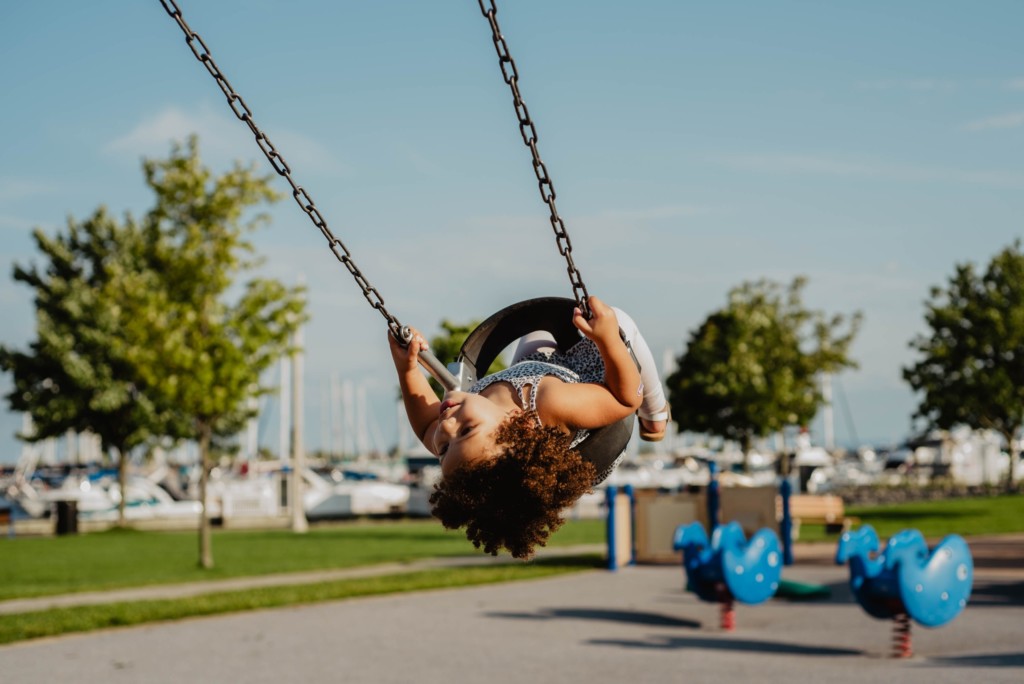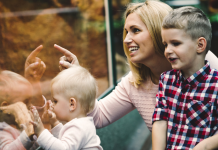In a very short time frame, life as our children and families knew it changed drastically in March 2020. A month later, we are still trying to make sense of our new normals, while trying to support our children and their understanding of the changing and uncertain world around them. When asked how are you? People respond with confusion and disbelief. Others respond with fear and anger. Many are feeling isolated and depressed, and especially on edge with anxiety. These are all normal responses to a global pandemic, one that has wreaked havoc in the lives of many.
How do we as adults help our children make sense of a scary new normal? One that creates so much uncertainly, worry, fear, sickness and loss? Families without jobs. Families without food or economic security. Families who were already dealing with managing mental health and now facing symptoms that are exacerbated by the pandemic. Children look to adults for a sense of normalcy and stability. How do we help our children feel a sense of safety, calm, happiness and perspective? How do we help convert their perception of the pain and feeling out of control into one of feeling in control? How do we take care of ourselves as parents, so that we can do and model the same?
Keeping perspective and feeling grounded is so important during times of crisis. While every family is managing different problems and different new normals, there are some constant universal ways that we can help children cope in healthy ways.
Validating feelings is so important. No matter the feelings expressed, our job isn’t to fix the problem. Our job is to be active listeners and validate the feelings. Reflecting back that the feeling expressed is a real and authentic one; one of value and one that deserves to be felt and expressed. Eg. of COVID-19 feelings to process; “I am sad because I am missing my friends.” “I am heartbroken that I am missing my prom and my graduation.” “I am angry you won’t let me see my friends.” “I am so scared when I hear the news and media on TV.” “Will you be safe Mommy? Don’t you and I have underlying health conditions?” “I am worried about my parents fighting more.” “My family is worried about making ends meet and paying their bills.” “I feel so bored.” “I feel lonely.” Why is this happening to us?” “I can’t shake this blah sad feeling.” “I miss grandma.” “Why can’t I visit my relative in the hospital now?” “When will this ever end?” “Will Mommy be OK having the baby in the hospital all alone?” “Is the baby in Mommy’s tummy going to be OK?” “I’m frustrated because I don’t understand this assignment!” “I’m scared and can’t sleep because I’m worried I will get sick.” “Will you be safe going to work Daddy?”
Create family time to talk about feelings and escalated behaviors. It’s OK to not feel OK on different days and accepting that your child and your family are managing new stressors is important during a health crisis. Make a worry box for children to write their worries and put them in a box to discuss. At family meeting time or bedtime, connect with your child and ask them what is thumbs up and thumbs down about their day or week. Ask them what their 3 wishes would be to make things better in the family. Give them 1:1 time and permission to ask for help and express what they are feeling. Brainstorm ways to help each other feel more supported while all at home full time.
Maintain regular virtual social connections. Utilizing virtual platforms to stay connected to friends and family helps. Virtual play dates. Virtual dance parties. Drive by birthday parties. Virtual fields trips to zoos and museums or farms. Virtual art and drawing classes. Virtual dance, gymnastics, sports classes. Help your child find ways to explore and connect with others from home. It is amazing how many free workshops, classes and children’s online support is now available for families to access. Children crave attention and connection and many need regular social support/ connection to feel happy and less isolated. Reaching out and helping others in need is another great way to feel less isolated and more in control. Eg. sending colorful pictures to grandparents or senior citizens in the nursing homes; learning to sew and make masks; making a meal and delivering it to a neighbor from a distance; writing a letter to a friend and surprise them by mailing them snail mail.
Find your child a Tele-Play Therapist who can support them during this uncertain time. The Telehealth therapist will check in with your child and family weekly and help your child/ your family with coping. Therapists have hit the ground running creating creative and amazing ( and HIIPA compliant) ways to connect with children/ families who need help managing overwhelming feelings, behaviors and familial changes. Insurance companies have quickly backed covering these appointments and many have even offered a limited free months of therapy to aid families in receiving mental health support during the pandemic. Sunshine Child Counseling in Alpharetta, GA has compassionate Tele-Play therapist accepting new clients currently.
Schedule regular outside time daily. Vitamin D and fresh air /oxygen breaks are so revitalizing for children and families. Find time to sit outside daily and listen to the birds chirp. Read a book with your child or have them put a hammock up in a tree to swing and look at the clouds. Pack a lunch or dinner and have a fun picnic on a blanket outside instead of inside at the table. Create a scavenger hunt in your yard and find items from outside to search and collect. Plant seeds and watch them grow. Set up a tent in the yard and ‘go camping.’ Put on your rainboots and splash in the rain puddles.
Move your body time. Keeping an exercise outlet and routine whenever possible is so helpful for maintaining positive mental health. Ride your bike, run or walk if you are able to; take a hike and breath in the therapeutic benefits of nature while appropriately social distancing. Virtual exercise classes for children and adults are being offered free all over the place now. Everything from Zumba to Yoga to Meditation are so relaxing and fun to do as a family to release stress and increase those endorphins to help fight the effects of stress. Nurturing our physical health directly impacts our mental and spiritual health.
Find a quiet space to just breathe. Listening to our breathing and feeling in control of our bodies and own health, while managing healthy social distancing is so powerful. With everyone home, help each family member create a special time/ space away from the family to just be by themselves. With so much time together, we all need to find creative ways to spend time apart. Many breathing apps are available for helping children and adults practice relaxing breathing techniques and calming visualization meditations.
Maintain a sense of routine and structure when possible. Lower superhero expectations and know you can’t juggle all the balls as a parent or child/ student, and that’s OK! While many parents are working from home and having to manage digital learning on top of their jobs, it’s important that children and teachers know your limitations as well. We all need to give ourselves and each other GRACE and just do our best in whatever survival capacity that looks like for your family now. We are all in this global pandemic together. And while it may feel like forever until we are back to a sense of normal as we knew it pre-pandemic, we just take it day by day. We JUST KEEP SWIMMING. And know that this too shall pass. Helping children understand that this is a temporary health crisis and educating children in age appropriate ways about the Coronavirus will help alleviate anxiety.
RESET Perspective. Helping children to feel empowered and in control during scary times is important. While many things are changing and they can’t control what happens to them, they CAN control how they react. They CAN utilize positive coping skills to reframe how they are perceiving the pandemic. They can and will get through this and can take care of their bodies, eating and exercising and sleeping well, washing their hands, asking for help, expressing feelings, etc. They can learn see the positives and feel grateful for extra time with their pets and family members. They can learn to use the downtime to be extra creative and learn something new like learning sign language on Youtube, or braiding their siblings hair or polishing up a new dance or craft.
Limit TV/ scary news time and don’t get glued to the daily COVID-19 reports. This increases anxiety not only for you, but for your children as well. While we want to be informed, and this is important, it is also important to moderate and create a balance when it comes to all of the new and changing COVID-19 information overload. Remember that what children at different ages hear on TV or see on the media can feel 10x scarier in their little minds. Children are sponges; do not assume they aren’t watching or listening, because they usually always are.
More than anything, reassuring our children that adults will keep them safe and protected is the most important message parents/ caregivers can relay during uncertain and scary times. Hugging your child daily and often can go a long way too…



















